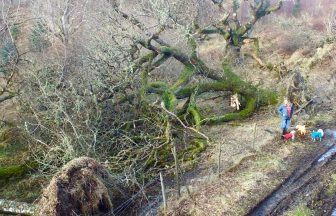A woman who was diagnosed with a brain tumour following a year and a half of misdiagnosis hopes a simple test devised by a Scottish university will speed up the process for others.
Heather Dearie, 35, visited her GP more than 10 times with symptoms over an 18-month period before being diagnosed with an acoustic neuroma brain tumour.
Now, a simple language test, devised by researchers from the University of Edinburgh and funded by the Brain Tumour Charity, could help diagnose brain tumours earlier.
The “Noah’s Ark” task asks participants to name as many animals as they can in 60 seconds and could help GPs identify patients with common symptoms – such as headaches – who are most likely to have a brain tumour.
Heather, from Ayrshire, who has been left with permanent facial paralysis, deafness in her right ear and no tear function in her right eye, says the new test could be a “significant advance” in helping people get the correct diagnosis.
She said: “Having my brain tumour diagnosed earlier could have changed my life completely and meant I would have had little to none of the lifelong side effects I have now.
“I was misdiagnosed for 18 months before my tumour was finally discovered and by then it was too late for any alternative treatment to surgery, which caused facial paralysis, 50 percent deafness, balance and vision issues, fatigue, nerve damage, muscle spasms and because there is still some residual tumour.
“I’ve had to have four corrective surgeries which I wouldn’t have needed had the tumour been found earlier. I’m in constant pain and it’s affected every aspect of a normal life.
“This could be a really significant advance.
“We urgently need to find new tools to support GPs and I really hope this test will help speed up the diagnosis process and help enable more people to get the treatment they need as quickly as possible.”
Lead author, Dr Paul Brennan, honorary consultant neurosurgeon at the University of Edinburgh, said: “The first symptoms experienced by patients with a brain tumour are often non-specific, such as headache, where a non-tumour diagnosis is much more likely.
“It remains difficult to determine which patients with these non-specific symptoms are most at risk of having a brain tumour. This unfortunately contributes to significant delays in diagnosis.
“Our study showed that a simple language test, which can be quickly and easily administered, could help GPs decide who is most likely to have a brain tumour.
“Symptomatic patients with low scores could be prioritised for rapid imaging, whilst other patients with high scores could be monitored as they are more likely to improve.”
Follow STV News on WhatsApp
Scan the QR code on your mobile device for all the latest news from around the country


 iStock
iStock

























